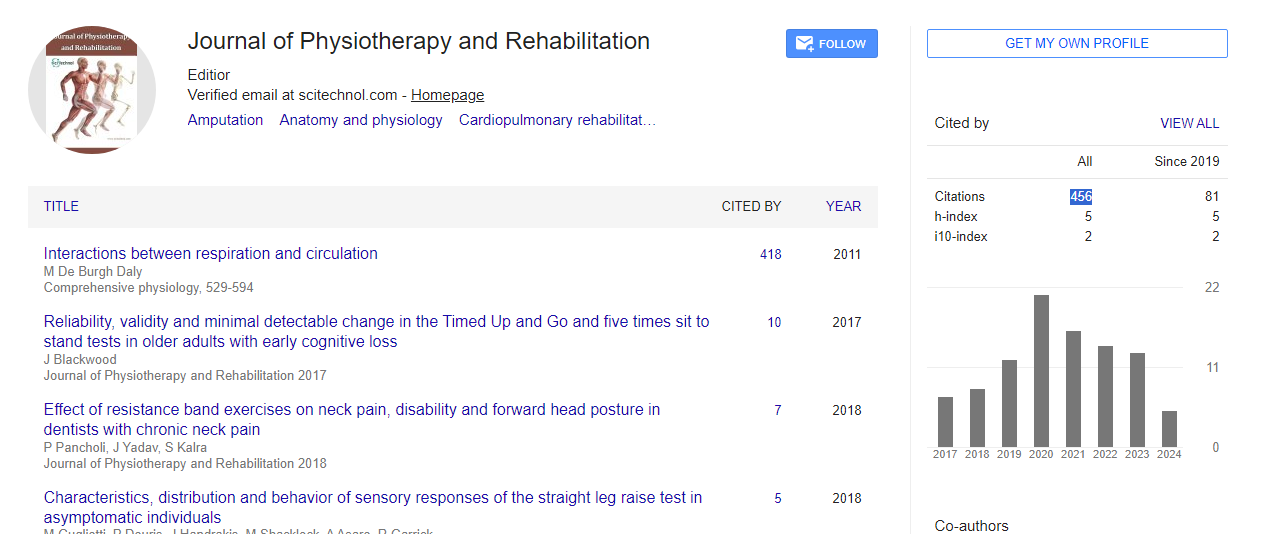Opinion Article, J Physiother Rehabi Vol: 8 Issue: 5
Psychoneuroimmunology Applications in Chronic Pain Management through Physiotherapy and Immune Modulation Strategies
Clara Nguyen*
1Department of Physiotherapy, University of Tasmania, Launceston, Australia
*Corresponding Author: Clara Nguyen,
Department of Physiotherapy, University
of Tasmania, Launceston, Australia
E-mail: clara.nguyen123@outlook.com.au
Received date: 24 September, 2024, Manuscript No. JPTR-24-151645
Editor assigned date: 26 September, 2024, PreQC No. JPTR-24-151645 (PQ);
Reviewed date: 10 October, 2024, QC No. JPTR-24-151645
Revised date: 17 October, 2024, Manuscript No. JPTR-24-151645 (R);
Published date: 24 October, 2024, DOI: 10.4172/JPTR.1000189.
Citation: Nguyen C (2024) Psychoneuroimmunology Applications in Chronic Pain Management through Physiotherapy and Immune Modulation Strategie. J Physiother Rehabi 8:5.
Description
Psychoneuroimmunology is a multidisciplinary field that explores the complicated connections between psychological processes, the nervous system and immune function. In recent years, its applications have gained resistance in chronic pain management, particularly through physiotherapy and immune modulation strategies. Chronic pain is a complex condition often influenced by psychological factors, including stress, anxiety and depression, which can complicate pain perception and after recovery. Understanding the interaction between these factors is essential for developing effective management strategies that address both the physical and psychological aspects of chronic pain. Physiotherapy plays an important role in the management of chronic pain, focusing on restoring function and mobility while alleviating pain. Traditional approaches often prioritize physical interventions, such as exercises, manual therapy and modalities like heat or cold therapy. However, incorporating psychoneuroimmunology principles into physiotherapy can enhance treatment outcomes. By acknowledging the impact of psychological factors on pain perception, physiotherapists can manipulate interventions to address the whole person, rather than just the symptoms.
One of the key psychoneuroimmunology applications in chronic pain management is the incorporation of Cognitive Behavioral Therapy (CBT) techniques into physiotherapy sessions. CBT helps patients reframe negative thoughts and beliefs surrounding their pain, fostering a more positive mindset. Research indicates that individuals who engage in CBT alongside physiotherapy report lower pain levels and improved functional outcomes. By addressing cognitive distortions, patients can develop healthier coping mechanisms that contribute to pain relief and enhance their overall well-being. These techniques promote relaxation and can lead to a decrease in pain perception. By integrating mindfulness into physiotherapy sessions, practitioners can empower patients to take an active role in their pain management, enhancing their sense of control and promoting flexibility.
The role of the immune system in chronic pain is increasingly recognized in psychoneuroimmunology. Chronic pain is often associated with inflammation, which can be exacerbated by stress and psychological distress. Immune modulation strategies, such as nutritional interventions, exercise and lifestyle modifications can plays an important role in managing inflammation and, consequently, pain levels. Regular exercise has been shown to enhance immune response and reduce inflammation. Physiotherapists can design individualized exercise programs that not only improve physical function but also target immune health. By focusing on consistent movement, patients may experience reduced pain levels and improved quality of life. Furthermore, educating patients about the benefits of physical activity on both physical and immune health can promote motivation and adherence to rehabilitation programs.
Conclusion
Psychoneuroimmunology offers valuable insights into the management of chronic pain through physiotherapy and immune modulation strategies. By integrating psychological approaches, such as CBT and mindfulness, into physiotherapy, practitioners can address the complex interaction between mind and body. Additionally, recognizing the role of the immune system in chronic pain allows for the implementation of targeted interventions that reduce inflammation and enhance recovery. As the understanding of psychoneuroimmunology continues to evolve, healthcare professionals are encouraged to adopt these principles to improve outcomes for individuals living with chronic pain, ultimately leading to a more effective and compassionate approach to rehabilitation.
 Spanish
Spanish  Chinese
Chinese  Russian
Russian  German
German  French
French  Japanese
Japanese  Portuguese
Portuguese  Hindi
Hindi 